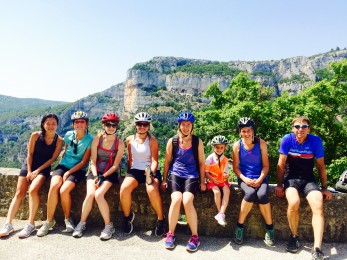Food, fitness in foreign lands
Professor Gary Miller and a handful of students are not attempting to travel around the world in 80 days, but they are keeping up a brisk pace as they hike and bike through Spain, France and Switzerland.
The three-week travel adventure is the global portion of a course Miller teaches, “Global Perspectives in Food, Activity and Health.” The class of six rising juniors and seniors, all women, left June 23 with Miller, his wife and 5-year-old daughter. (Read about his family’s global travels in this recent story.) They wrapped up two weeks of course work on campus studying traditional diets, forms of activity, and how culture influences what people eat. Through July 15, they will be experiencing what they learned in class as they travel through Bilbao, Spain, Avignon, France, and Interlaken, Switzerland. Miller said that while these three countries are adjacent to each other in Western Europe, their cultures vary dramatically, and this is reflected in their dietary practices.
The group is hiking up to 10 miles a day, riding bikes up to 20 miles a day, occasionally sleeping in huts, visiting local food markets for fresh fruits and vegetables, and participating in cooking classes. In Spain, they learned how to make paella, a native dish of rice, saffron, chicken or seafood that is cooked and served in a large shallow pan.
“This trip is meant to be a physically active experience,” said Miller, associate professor of Health and Exercise Science (HES). “We will participate in many traditional activities surrounding diet and activity, and observe and engage in the dietary practices of the regions. These experiences will serve as laboratory for the theories and knowledge gained in our class discussions.”
Before setting out, the students all agreed they were looking forward to the trip, especially the opportunity to travel lesser known areas and back roads.
“I’ve traveled to Europe before but I’ve never been able to do a more outdoors adventure like this one, and I’m interested in being in more rural areas,” said Maddy Nelson, a rising senior majoring in Spanish.
Nelson’s fellow travel companions include Ayla Acosta, a rising junior majoring in communication; Emily Carey and Meredith Elgin, rising juniors studying HES and biology; Megan Johnson, a rising junior studying HES, and Suki Du, a rising senior also studying HES.
During some down time, the students shared some thoughts on their experiences. “We’ve discovered that in Europe there’s a heavier concentration on the preparation and thought that goes into food, while in the U.S. we tend to be more focused on the accessibility and convenience of our food,” said Acosta. “If anything, I’ve learned more about balancing a healthy diet with exercise instead of cutting calories. People don’t realize that the nutritional benefits of food have a huge impact on their health. Just from being here, I’ve already felt healthier and more energized than I did eating foods from grocery stores back at home.”
The culture of food is different in Europe, said Nelson. “They spend more time enjoying their meals rather than quick service. There’s more enjoyment of the food in between courses and there’s not a huge focus on calorie intake.”
Categories: Experiential Learning, Global Wake Forest, Research & Discovery, Wellbeing
Media Contact
Wake Forest News
media@wfu.edu
336.758.5237




